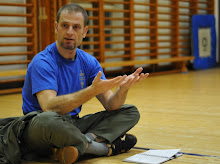 It was a few weeks ago on a Sunday morning when I found myself in an airport, ready to board an airplane, with nothing to read during the flight. My only option was the airport newsstand and, without giving it too much thought, I picked something from the non-fiction shelves - a book titled Drive: The Surprising Truth About What Motivates Us, by Daniel H. Pink. The book is about human motivation, the things that make us tick, and what scientific research has discovered on the subject. I found it a pretty insightful read, although the author tries to reach conclusions mostly on the gap between what science knows and what is commonly practiced in the field of business management (which I do not care much about). What impressed me the most from Daniel Pink's argument for the need of a new approach in order for people to get motivated, creative and productive, is the importance of the element of mastery, i.e. the urge most of us have to become better and better at something that matters. Here's some advice the author gives, which I believe will be helpful and inspirational to martial arts practitioners:
It was a few weeks ago on a Sunday morning when I found myself in an airport, ready to board an airplane, with nothing to read during the flight. My only option was the airport newsstand and, without giving it too much thought, I picked something from the non-fiction shelves - a book titled Drive: The Surprising Truth About What Motivates Us, by Daniel H. Pink. The book is about human motivation, the things that make us tick, and what scientific research has discovered on the subject. I found it a pretty insightful read, although the author tries to reach conclusions mostly on the gap between what science knows and what is commonly practiced in the field of business management (which I do not care much about). What impressed me the most from Daniel Pink's argument for the need of a new approach in order for people to get motivated, creative and productive, is the importance of the element of mastery, i.e. the urge most of us have to become better and better at something that matters. Here's some advice the author gives, which I believe will be helpful and inspirational to martial arts practitioners:"One key to mastery is what Florida State University psychology professor Anders Ericsson calls 'deliberate practice' - a 'lifelong period of... effort to improve performance in a specific domain[. Deliberate practice isn't running a few miles each day or banging on the piano for twenty minutes each morning. It's much more purposeful, focused, and, yes, painful. Follow these steps - over and over again for a decade - and you just might become a master.
- Remember that deliberate practice has one objective: to improve performance. 'People who play tennis once a week for years don't get any better if they do the same thing each time', Ericsson has said. 'Deliberate practice is about changing your perfromance, setting new goals and straining yourself to reach a bit higher each time'.
- Repeat, repeat, repeat. Repetition matters. Basketball greats don't shoot ten free throws at the end of team practice; they shoot five hundred.
- Seek constant,critical feedback. If you don't know how you're doing, you won't know what to improve.
- Focus ruthlessly on where you need help. While many of us work on what we're already good at, say Ericsson, 'those who get better work on their weaknesses'.
- Prepare for the process to be mentally and physically exhausting. That's why so few people commit to it, but that's why it works".
You can buy Daniel H. Pink's book Drive: The Surprising Truth About What Motivates us, here (Amazon UK).






